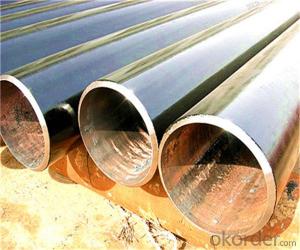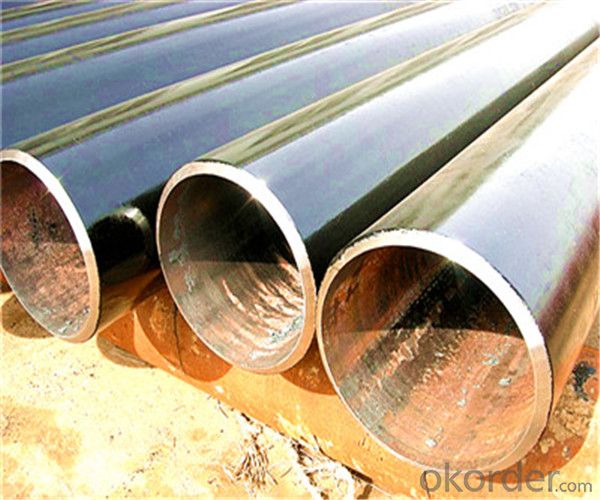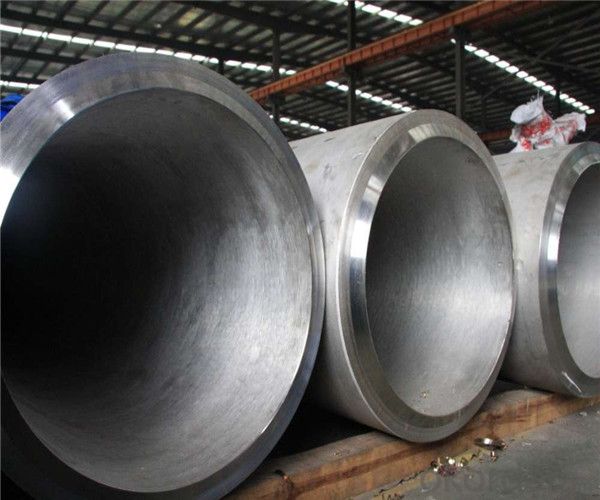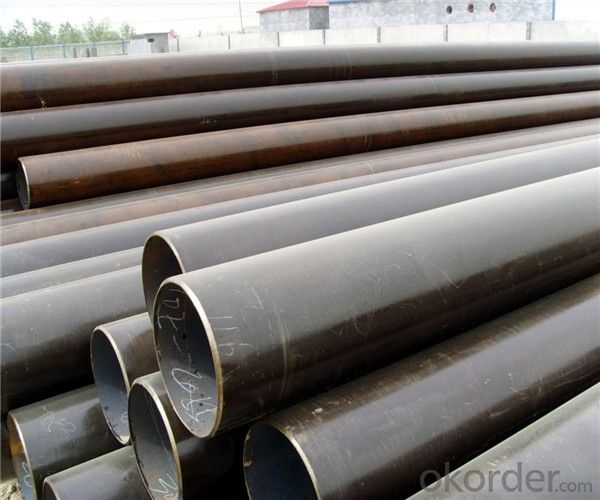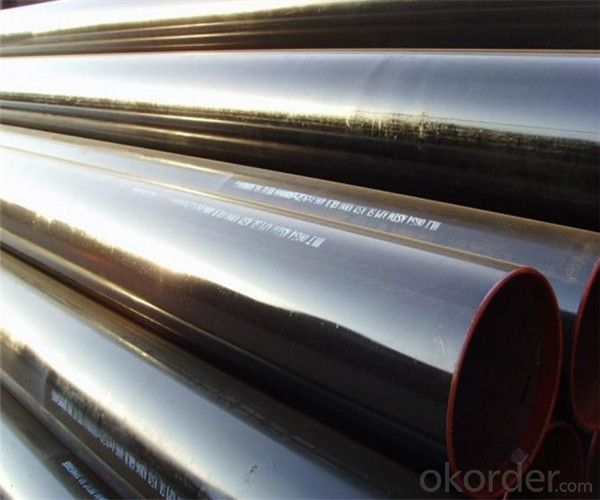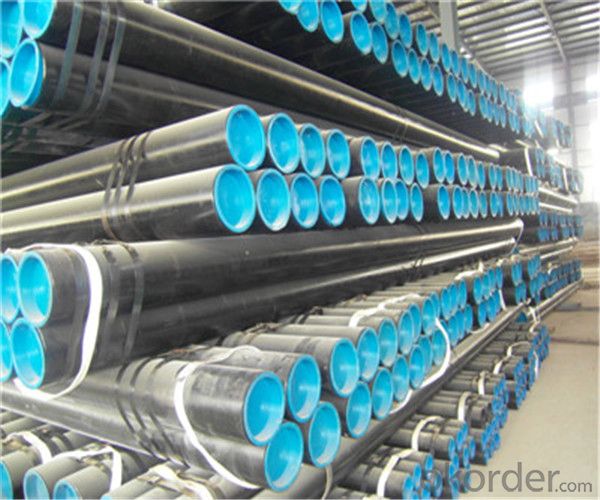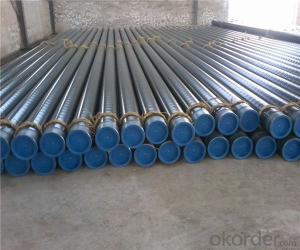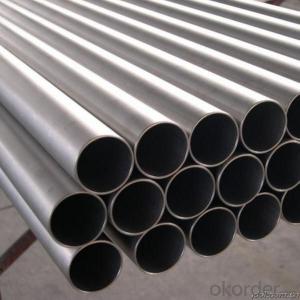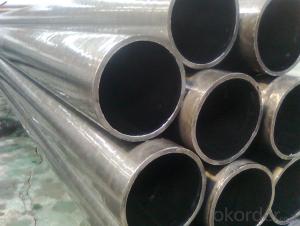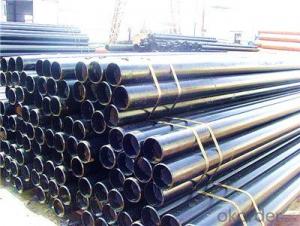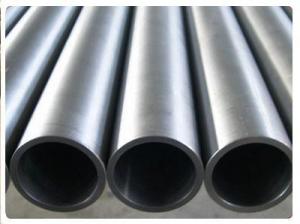Seamless Steel Pipe High Quality from Factory Price
- Loading Port:
- Tianjin
- Payment Terms:
- TT OR LC
- Min Order Qty:
- 50 m.t.
- Supply Capability:
- 3000000 m.t./month
OKorder Service Pledge
OKorder Financial Service
You Might Also Like
PRODUCT DETAILS
1.Structure of Seamless Steel Pipe Description:
A large amount of Seamless Steel Pipes is offered to the clients at cost effective rates. These pipes are extremely durable, resistant to corrosion and have high tensile strength. Our pipes are used in nuclear plants, power plants, refineries and construction industry across the country. Furthermore, we are capable of providing these seamless pipes to the clients in bulk quantity.
2.Packaging & Delivery:
| Packaging Details: | Seaworthy packages, bundles wrapped with strong steel strip |
| Delivery Detail: | 15-30 days after received 30% TT |
3.Main Features of the Steel Pipe:
• High manufacturing accuracy
• High strength
• Small inertia resistance
• Strong heat dissipation ability
• Good visual effect
•Reasonable price
4.Seamless Steel Pipe Specification:
| Standard: | GB, DIN, ASTM,ASME, ASTM A106-2006, ASTM A53-2007 |
| Grade: | 10#,20#, 45#, 16Mn |
Thickness: | 8 - 33 mm |
| Section Shape: | Round |
| Outer Diameter: | 133 - 219 mm |
| Place of Origin: | Shandong, China (Mainland) |
| Secondary Or Not: | Non-secondary |
| Application: | Hydraulic Pipe |
| Technique: | Cold Drawn |
| Certification: | API |
| Surface Treatment: | factory state or painted black |
| Special Pipe: | API Pipe |
| Alloy Or Not: | Non-alloy |
| Length: | 5-12M |
| Outer Diameter: | 21.3-610mm |
5.FAQ of Seamless steel pipe:
①How is the quality of your products?
Our products are manufactured strictly according to national and internaional standard, and we take a test
on every pipe before delivered out. If you want see our quality certifications and all kinds of testing report, please just ask us for it.
Guaranteed: If products’ quality don’t accord to discription as we give or the promise before you place order, we promise 100% refund.
②How about price?
Yes, we are factory and be able to give you lowest price below market one, and we have a policy that “ for saving time and absolutely honest business attitude, we quote as lowest as possible for any customer, and discount can be given according to quantity”,if you like bargain and factory price is not low enough as you think, just don’t waste your time.Please trust the quotation we would give you, it is professional one.
③Why should you chose us?
Chose happens because of quality, then price, We can give you both.Additionally, we can also offer professional products inquiry, products knowledge train(for agents), smooth goods delivery, exellent customer solution proposals.Our service formula: good quality+good price+good service=customer’s trust.
SGS test is available, customer inspection before shipping is welcome, third party inspection is no problem.
Any question, pls feel free to contact us !
- Q: What does seamless steel tube mean? What are the main uses? What are the classifications?
- The production process of seamless steel tube in general can be divided into two kinds of hot rolling and cold drawing, cold-rolled seamless steel pipe production process than hot-rolled billet to complex, first to three roller rolling and extrusion to sizing test, if the tube through the cutting machine cutting surface without crack growth response after cutting blank about one meter. Then enter the annealing process, annealing and pickling to use acid pickling liquid, should pay attention to the surface if there are a lot of bubbling, if there are a large number of bubbling pipe shows that the quality is not up to the standard. The appearance of cold rolling seamless steel tube shorter than hot-rolled seamless steel pipe, cold rolled seamless steel pipe wall thickness is generally higher than hot-rolled seamless steel pipe to be small, but the surface looks better than thick wall seamless steel pipe is more bright, rough surface is not too much, not too much burr diameter.
- Q: What is the difference between carbon steel pipes and stainless steel pipes?
- The main difference between carbon steel pipes and stainless steel pipes lies in their composition. Carbon steel pipes are primarily made of iron and carbon, while stainless steel pipes contain iron, carbon, and a minimum of 10.5% chromium. This high chromium content in stainless steel pipes provides excellent corrosion resistance, making them suitable for various applications in industries like food processing, chemical, and oil & gas. On the other hand, carbon steel pipes are more cost-effective and have higher strength than stainless steel pipes, but they are more susceptible to corrosion and thus require regular maintenance and coating for protection.
- Q: What is the difference between nominal and actual pipe size?
- The nominal pipe size refers to the approximate inside diameter of a pipe, while the actual pipe size refers to the exact inside diameter. The nominal size is used for general identification purposes, while the actual size is more precise and is used for engineering calculations and pipe fittings.
- Q: How do you calculate the pipe friction loss for steel pipes?
- To calculate the pipe friction loss for steel pipes, you need to use the Darcy-Weisbach equation. This equation is commonly used in fluid dynamics to determine the pressure drop or friction loss due to the flow of fluid through a pipe. The equation is as follows: ΔP = (f * L * ρ * V²) / (2 * D) Where: ΔP = Pressure drop or friction loss f = Darcy friction factor L = Length of the pipe ρ = Density of the fluid V = Velocity of the fluid D = Diameter of the pipe The Darcy friction factor (f) is a dimensionless value that depends on the Reynolds number (Re) and the relative roughness (ε/D) of the pipe, where ε is the absolute roughness of the pipe. To determine the friction factor, you can use various correlations or Moody's diagram. Once you have the friction factor, you can plug in the values for length, density, velocity, and diameter into the equation to calculate the pressure drop or friction loss. It is important to note that the units of all the variables should be consistent (e.g., length in meters, density in kg/m³, velocity in m/s, diameter in meters) to obtain accurate results. By using this equation and obtaining the necessary parameters, you can calculate the pipe friction loss for steel pipes, which is crucial in designing and analyzing fluid flow systems.
- Q: Are steel pipes affected by magnetic fields?
- Yes, steel pipes can be affected by magnetic fields. Steel is a ferromagnetic material, which means it is strongly attracted to magnets and can be magnetized. When exposed to a magnetic field, steel pipes can become magnetized, causing them to behave like magnets themselves. This magnetic effect can have several implications. First, if steel pipes are near strong magnetic fields, such as those generated by electrical currents or powerful magnets, they can experience a force that may cause them to move or vibrate. This can be problematic in certain applications, especially if the pipes need to remain stable and secure. Second, the presence of magnetic fields can induce electrical currents in steel pipes. These currents, known as eddy currents, can generate heat and energy losses. In some cases, this can lead to inefficiencies and increased energy consumption in systems that involve steel pipes. Lastly, magnetic fields can also affect the accuracy of magnetic measurement devices used to detect defects or corrosion in steel pipes. The presence of a magnetic field can interfere with the readings, making it more challenging to accurately assess the condition of the pipes. To mitigate these effects, various measures can be taken. For instance, in applications where stability is crucial, steel pipes can be shielded or isolated from strong magnetic fields using non-magnetic materials. Additionally, the impact of eddy currents can be minimized by using pipes with proper insulation or by using magnetic shielding techniques. Overall, while steel pipes are indeed affected by magnetic fields, the extent of the impact depends on factors such as the strength of the magnetic field, the composition of the steel, and the specific application or environment in which the pipes are used.
- Q: Can steel pipes be used for underground steam pipelines?
- Indeed, underground steam pipelines can indeed utilize steel pipes. Given their robust and enduring characteristics, steel pipes are frequently employed for an assortment of pipelines, such as those carrying steam. Their capacity to endure elevated temperatures and pressures renders them suitable for the subterranean transportation of steam. Furthermore, steel pipes exhibit outstanding resistance to corrosion, a crucial feature for subterranean pipelines that encounter moisture and potentially corrosive substances in the soil. In summary, steel pipes represent a dependable and widely embraced option for underground steam pipelines.
- Q: How are steel pipes used in the manufacturing of geothermal systems?
- Steel pipes are used in the manufacturing of geothermal systems primarily for their durability and heat resistance. These pipes are used to transport geothermal fluids, such as water or steam, from the underground reservoir to the surface, where they can be utilized for heating or electricity generation. The high strength and corrosion resistance of steel pipes make them ideal for withstanding the harsh conditions and high temperatures encountered in geothermal applications. Additionally, steel pipes can be easily welded and connected, allowing for efficient installation and maintenance of geothermal systems.
- Q: How are steel pipes used in construction?
- Steel pipes are commonly used in construction for various purposes such as structural supports, plumbing systems, and underground utility installations. They provide strength, durability, and resistance to corrosion, making them ideal for carrying fluids, gases, and other materials. Additionally, steel pipes can be easily welded, allowing for efficient and secure connections in building frameworks and infrastructure.
- Q: What are the common welding techniques used for steel pipes?
- The common welding techniques used for steel pipes include shielded metal arc welding (SMAW), gas metal arc welding (GMAW), flux-cored arc welding (FCAW), and submerged arc welding (SAW).
- Q: How do you calculate the weight of a steel pipe?
- In order to determine the weight of a steel pipe, one must possess knowledge of the pipe's dimensions, specifically the outer diameter (OD), wall thickness, and length. Initially, one must ascertain the cross-sectional area of the pipe. This can be accomplished by subtracting the inner diameter (ID) from the outer diameter (OD) and dividing the outcome by 2 to acquire the radius. Subsequently, the formula A = πr^2 can be employed to compute the area. Following this, it is necessary to multiply the cross-sectional area by the length of the pipe to obtain the volume. The formula for volume is V = A * L, where A denotes the cross-sectional area and L signifies the length. Lastly, to determine the weight of the steel pipe, one must multiply the volume by the density of steel. The density of steel generally falls around 7850 kilograms per cubic meter (kg/m^3) or 0.2836 pounds per cubic inch (lb/in^3). The formula for weight is W = V * ρ, where V represents the volume and ρ denotes the density of steel. It is crucial to note that if one is employing different units, a conversion is imperative to match the units of the density. For instance, if the length is in feet and the density is in pounds per cubic inch, the length must be converted to inches prior to conducting the calculations. Always remember to thoroughly verify your measurements and calculations to ensure precision.
Send your message to us
Seamless Steel Pipe High Quality from Factory Price
- Loading Port:
- Tianjin
- Payment Terms:
- TT OR LC
- Min Order Qty:
- 50 m.t.
- Supply Capability:
- 3000000 m.t./month
OKorder Service Pledge
OKorder Financial Service
Similar products
Hot products
Hot Searches
Related keywords
